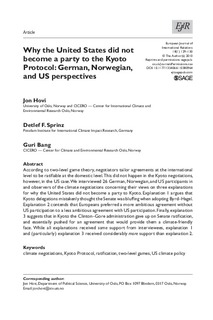Why the United States did not become a party to the Kyoto Protocol: German, Norwegian, and US perspectives
Journal article, Peer reviewed
Permanent lenke
http://hdl.handle.net/11250/2466148Utgivelsesdato
2012Metadata
Vis full innførselSamlinger
- Journal articles [478]
Originalversjon
European Journal of International Relations. 2012, 18 (1), 129-150. 10.1177/1354066110380964Sammendrag
According to two-level game theory, negotiators tailor agreements at the international level to be ratifiable at the domestic level. This did not happen in the Kyoto negotiations, however, in the US case. We interviewed 26 German, Norwegian, and US participants in and observers of the climate negotiations concerning their views on three explanations for why the United States did not become a party to Kyoto. Explanation 1 argues that Kyoto delegations mistakenly thought the Senate was bluffing when adopting Byrd–Hagel. Explanation 2 contends that Europeans preferred a more ambitious agreement without US participation to a less ambitious agreement with US participation. Finally, explanation 3 suggests that in Kyoto the Clinton–Gore administration gave up on Senate ratification, and essentially pushed for an agreement that would provide them a climate-friendly face. While all explanations received some support from interviewees, explanation 1 and (particularly) explanation 3 received considerably more support than explanation 2.
